Portfolio 1: Analysis of CSR, Whistleblowing, and Social Media Impact
VerifiedAdded on 2023/01/17
|8
|2129
|49
Portfolio
AI Summary
This portfolio presents a reflective analysis of three seminars focusing on Corporate Social Responsibility (CSR), whistleblowing, and the role of social media in business, particularly for Small and Medium Enterprises (SMEs). The first seminar explored various CSR approaches (volunteerism, environmental conservation, diversity and labor practices, and philanthropic efforts) and their challenges for SMEs, including the financial burden of mandatory CSR obligations. The second seminar delved into the ethics of whistleblowing, contrasting its benefits for stakeholders in revealing organizational wrongdoing with concerns about confidentiality and workplace ethics. The third seminar examined the use of social media by SMEs, highlighting its cost-effectiveness for marketing and communication while acknowledging potential difficulties such as brand image management and increased competition. The portfolio synthesizes the learnings from these seminars, comparing arguments and reflecting on the impact of these topics on business practices and ethical considerations, emphasizing the interconnectedness of CSR, ethical behavior, and strategic use of social media in the business environment. The author concludes with a summary of the key takeaways and the evolution of their understanding of the topics covered.

Portfolio
1
1
Paraphrase This Document
Need a fresh take? Get an instant paraphrase of this document with our AI Paraphraser
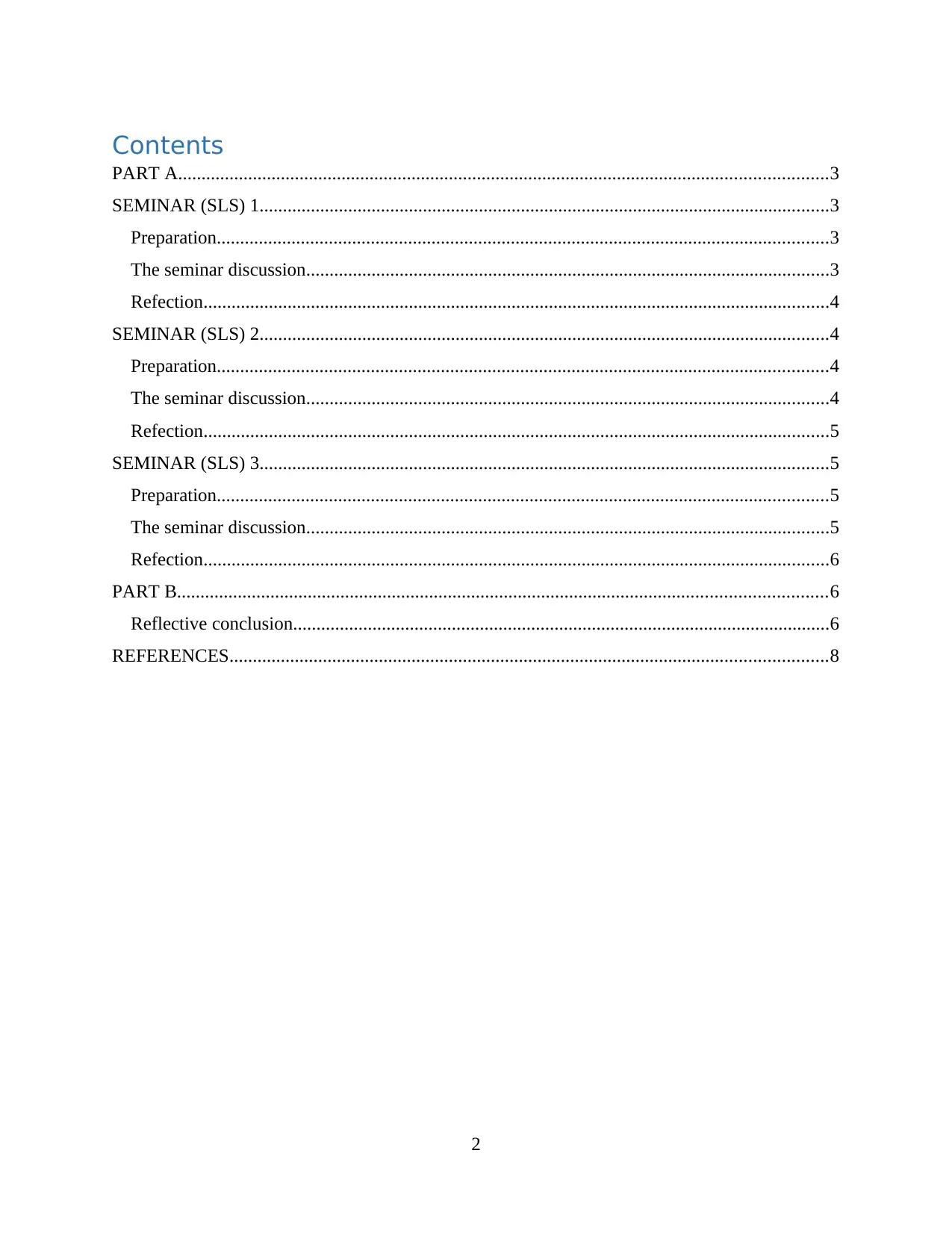
Contents
PART A...........................................................................................................................................3
SEMINAR (SLS) 1..........................................................................................................................3
Preparation...................................................................................................................................3
The seminar discussion................................................................................................................3
Refection......................................................................................................................................4
SEMINAR (SLS) 2..........................................................................................................................4
Preparation...................................................................................................................................4
The seminar discussion................................................................................................................4
Refection......................................................................................................................................5
SEMINAR (SLS) 3..........................................................................................................................5
Preparation...................................................................................................................................5
The seminar discussion................................................................................................................5
Refection......................................................................................................................................6
PART B...........................................................................................................................................6
Reflective conclusion...................................................................................................................6
REFERENCES................................................................................................................................8
2
PART A...........................................................................................................................................3
SEMINAR (SLS) 1..........................................................................................................................3
Preparation...................................................................................................................................3
The seminar discussion................................................................................................................3
Refection......................................................................................................................................4
SEMINAR (SLS) 2..........................................................................................................................4
Preparation...................................................................................................................................4
The seminar discussion................................................................................................................4
Refection......................................................................................................................................5
SEMINAR (SLS) 3..........................................................................................................................5
Preparation...................................................................................................................................5
The seminar discussion................................................................................................................5
Refection......................................................................................................................................6
PART B...........................................................................................................................................6
Reflective conclusion...................................................................................................................6
REFERENCES................................................................................................................................8
2
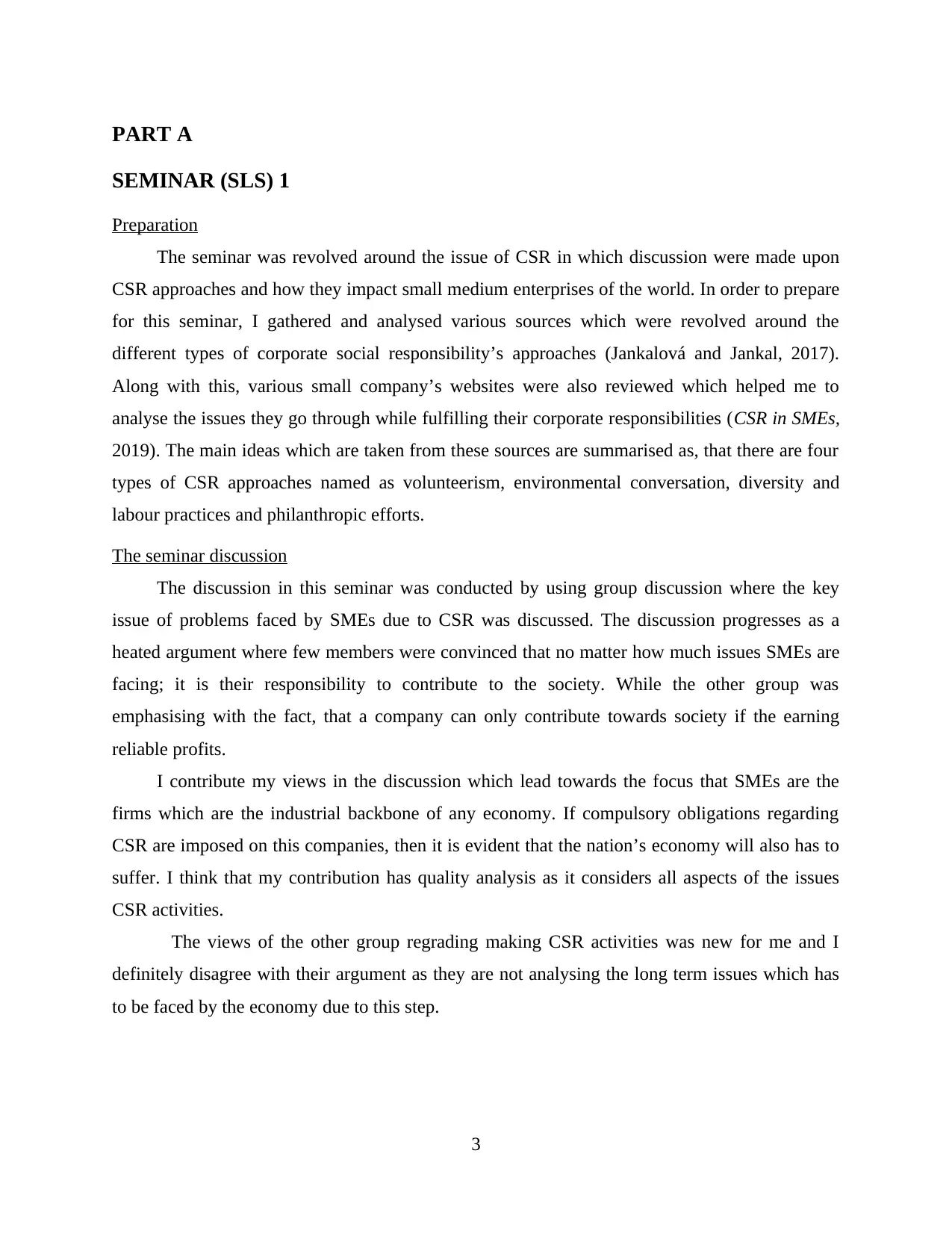
PART A
SEMINAR (SLS) 1
Preparation
The seminar was revolved around the issue of CSR in which discussion were made upon
CSR approaches and how they impact small medium enterprises of the world. In order to prepare
for this seminar, I gathered and analysed various sources which were revolved around the
different types of corporate social responsibility’s approaches (Jankalová and Jankal, 2017).
Along with this, various small company’s websites were also reviewed which helped me to
analyse the issues they go through while fulfilling their corporate responsibilities (CSR in SMEs,
2019). The main ideas which are taken from these sources are summarised as, that there are four
types of CSR approaches named as volunteerism, environmental conversation, diversity and
labour practices and philanthropic efforts.
The seminar discussion
The discussion in this seminar was conducted by using group discussion where the key
issue of problems faced by SMEs due to CSR was discussed. The discussion progresses as a
heated argument where few members were convinced that no matter how much issues SMEs are
facing; it is their responsibility to contribute to the society. While the other group was
emphasising with the fact, that a company can only contribute towards society if the earning
reliable profits.
I contribute my views in the discussion which lead towards the focus that SMEs are the
firms which are the industrial backbone of any economy. If compulsory obligations regarding
CSR are imposed on this companies, then it is evident that the nation’s economy will also has to
suffer. I think that my contribution has quality analysis as it considers all aspects of the issues
CSR activities.
The views of the other group regrading making CSR activities was new for me and I
definitely disagree with their argument as they are not analysing the long term issues which has
to be faced by the economy due to this step.
3
SEMINAR (SLS) 1
Preparation
The seminar was revolved around the issue of CSR in which discussion were made upon
CSR approaches and how they impact small medium enterprises of the world. In order to prepare
for this seminar, I gathered and analysed various sources which were revolved around the
different types of corporate social responsibility’s approaches (Jankalová and Jankal, 2017).
Along with this, various small company’s websites were also reviewed which helped me to
analyse the issues they go through while fulfilling their corporate responsibilities (CSR in SMEs,
2019). The main ideas which are taken from these sources are summarised as, that there are four
types of CSR approaches named as volunteerism, environmental conversation, diversity and
labour practices and philanthropic efforts.
The seminar discussion
The discussion in this seminar was conducted by using group discussion where the key
issue of problems faced by SMEs due to CSR was discussed. The discussion progresses as a
heated argument where few members were convinced that no matter how much issues SMEs are
facing; it is their responsibility to contribute to the society. While the other group was
emphasising with the fact, that a company can only contribute towards society if the earning
reliable profits.
I contribute my views in the discussion which lead towards the focus that SMEs are the
firms which are the industrial backbone of any economy. If compulsory obligations regarding
CSR are imposed on this companies, then it is evident that the nation’s economy will also has to
suffer. I think that my contribution has quality analysis as it considers all aspects of the issues
CSR activities.
The views of the other group regrading making CSR activities was new for me and I
definitely disagree with their argument as they are not analysing the long term issues which has
to be faced by the economy due to this step.
3
⊘ This is a preview!⊘
Do you want full access?
Subscribe today to unlock all pages.

Trusted by 1+ million students worldwide
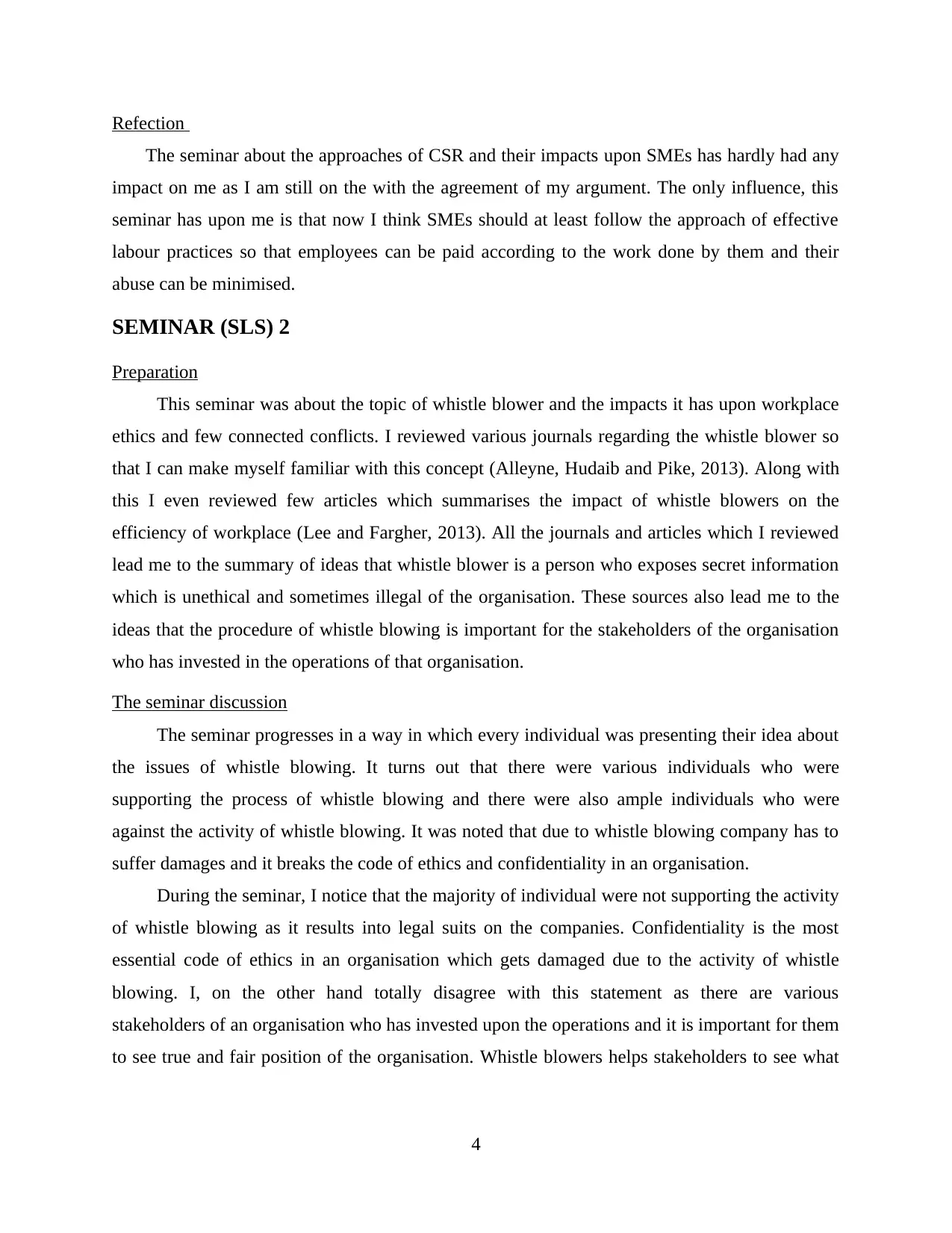
Refection
The seminar about the approaches of CSR and their impacts upon SMEs has hardly had any
impact on me as I am still on the with the agreement of my argument. The only influence, this
seminar has upon me is that now I think SMEs should at least follow the approach of effective
labour practices so that employees can be paid according to the work done by them and their
abuse can be minimised.
SEMINAR (SLS) 2
Preparation
This seminar was about the topic of whistle blower and the impacts it has upon workplace
ethics and few connected conflicts. I reviewed various journals regarding the whistle blower so
that I can make myself familiar with this concept (Alleyne, Hudaib and Pike, 2013). Along with
this I even reviewed few articles which summarises the impact of whistle blowers on the
efficiency of workplace (Lee and Fargher, 2013). All the journals and articles which I reviewed
lead me to the summary of ideas that whistle blower is a person who exposes secret information
which is unethical and sometimes illegal of the organisation. These sources also lead me to the
ideas that the procedure of whistle blowing is important for the stakeholders of the organisation
who has invested in the operations of that organisation.
The seminar discussion
The seminar progresses in a way in which every individual was presenting their idea about
the issues of whistle blowing. It turns out that there were various individuals who were
supporting the process of whistle blowing and there were also ample individuals who were
against the activity of whistle blowing. It was noted that due to whistle blowing company has to
suffer damages and it breaks the code of ethics and confidentiality in an organisation.
During the seminar, I notice that the majority of individual were not supporting the activity
of whistle blowing as it results into legal suits on the companies. Confidentiality is the most
essential code of ethics in an organisation which gets damaged due to the activity of whistle
blowing. I, on the other hand totally disagree with this statement as there are various
stakeholders of an organisation who has invested upon the operations and it is important for them
to see true and fair position of the organisation. Whistle blowers helps stakeholders to see what
4
The seminar about the approaches of CSR and their impacts upon SMEs has hardly had any
impact on me as I am still on the with the agreement of my argument. The only influence, this
seminar has upon me is that now I think SMEs should at least follow the approach of effective
labour practices so that employees can be paid according to the work done by them and their
abuse can be minimised.
SEMINAR (SLS) 2
Preparation
This seminar was about the topic of whistle blower and the impacts it has upon workplace
ethics and few connected conflicts. I reviewed various journals regarding the whistle blower so
that I can make myself familiar with this concept (Alleyne, Hudaib and Pike, 2013). Along with
this I even reviewed few articles which summarises the impact of whistle blowers on the
efficiency of workplace (Lee and Fargher, 2013). All the journals and articles which I reviewed
lead me to the summary of ideas that whistle blower is a person who exposes secret information
which is unethical and sometimes illegal of the organisation. These sources also lead me to the
ideas that the procedure of whistle blowing is important for the stakeholders of the organisation
who has invested in the operations of that organisation.
The seminar discussion
The seminar progresses in a way in which every individual was presenting their idea about
the issues of whistle blowing. It turns out that there were various individuals who were
supporting the process of whistle blowing and there were also ample individuals who were
against the activity of whistle blowing. It was noted that due to whistle blowing company has to
suffer damages and it breaks the code of ethics and confidentiality in an organisation.
During the seminar, I notice that the majority of individual were not supporting the activity
of whistle blowing as it results into legal suits on the companies. Confidentiality is the most
essential code of ethics in an organisation which gets damaged due to the activity of whistle
blowing. I, on the other hand totally disagree with this statement as there are various
stakeholders of an organisation who has invested upon the operations and it is important for them
to see true and fair position of the organisation. Whistle blowers helps stakeholders to see what
4
Paraphrase This Document
Need a fresh take? Get an instant paraphrase of this document with our AI Paraphraser
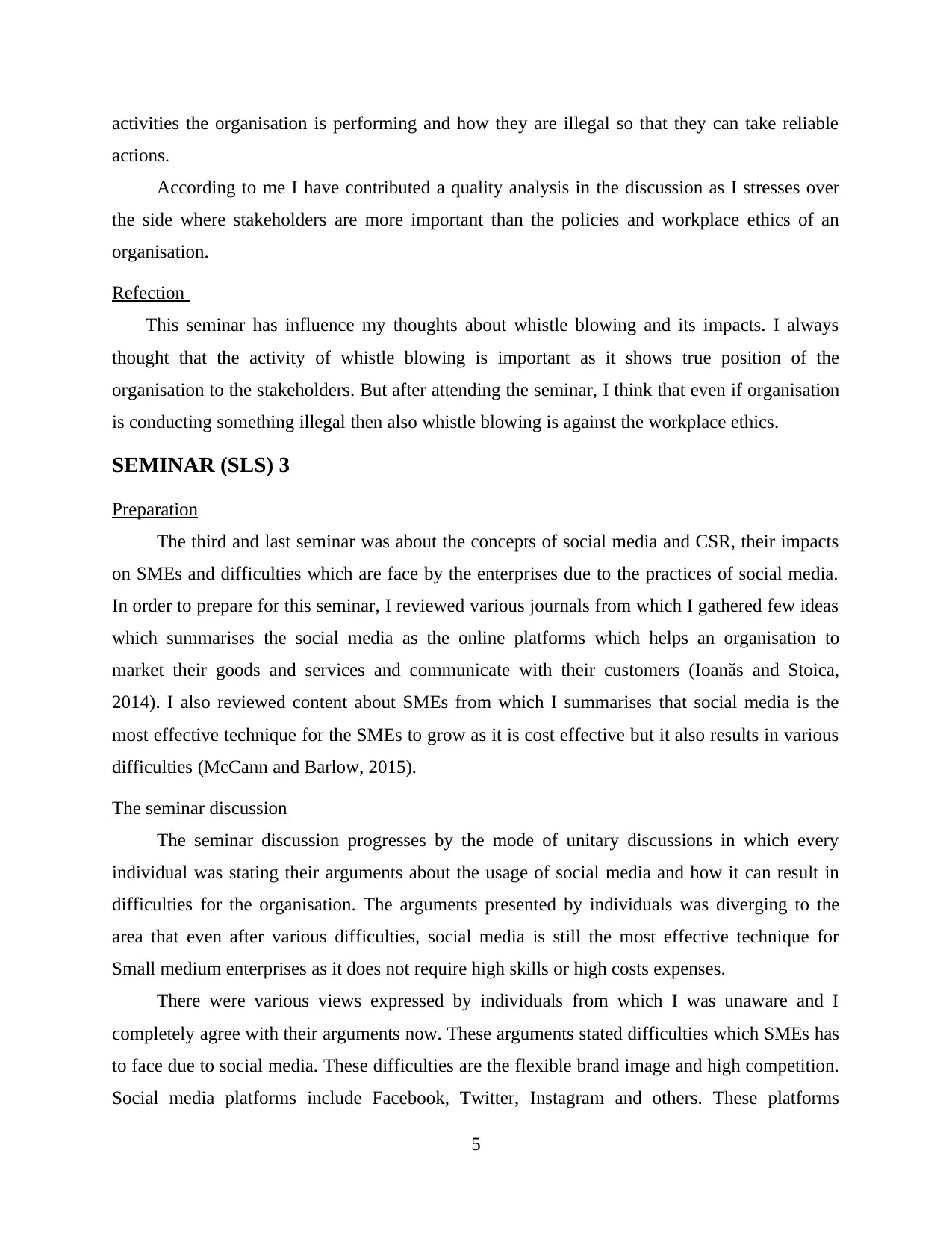
activities the organisation is performing and how they are illegal so that they can take reliable
actions.
According to me I have contributed a quality analysis in the discussion as I stresses over
the side where stakeholders are more important than the policies and workplace ethics of an
organisation.
Refection
This seminar has influence my thoughts about whistle blowing and its impacts. I always
thought that the activity of whistle blowing is important as it shows true position of the
organisation to the stakeholders. But after attending the seminar, I think that even if organisation
is conducting something illegal then also whistle blowing is against the workplace ethics.
SEMINAR (SLS) 3
Preparation
The third and last seminar was about the concepts of social media and CSR, their impacts
on SMEs and difficulties which are face by the enterprises due to the practices of social media.
In order to prepare for this seminar, I reviewed various journals from which I gathered few ideas
which summarises the social media as the online platforms which helps an organisation to
market their goods and services and communicate with their customers (Ioanăs and Stoica,
2014). I also reviewed content about SMEs from which I summarises that social media is the
most effective technique for the SMEs to grow as it is cost effective but it also results in various
difficulties (McCann and Barlow, 2015).
The seminar discussion
The seminar discussion progresses by the mode of unitary discussions in which every
individual was stating their arguments about the usage of social media and how it can result in
difficulties for the organisation. The arguments presented by individuals was diverging to the
area that even after various difficulties, social media is still the most effective technique for
Small medium enterprises as it does not require high skills or high costs expenses.
There were various views expressed by individuals from which I was unaware and I
completely agree with their arguments now. These arguments stated difficulties which SMEs has
to face due to social media. These difficulties are the flexible brand image and high competition.
Social media platforms include Facebook, Twitter, Instagram and others. These platforms
5
actions.
According to me I have contributed a quality analysis in the discussion as I stresses over
the side where stakeholders are more important than the policies and workplace ethics of an
organisation.
Refection
This seminar has influence my thoughts about whistle blowing and its impacts. I always
thought that the activity of whistle blowing is important as it shows true position of the
organisation to the stakeholders. But after attending the seminar, I think that even if organisation
is conducting something illegal then also whistle blowing is against the workplace ethics.
SEMINAR (SLS) 3
Preparation
The third and last seminar was about the concepts of social media and CSR, their impacts
on SMEs and difficulties which are face by the enterprises due to the practices of social media.
In order to prepare for this seminar, I reviewed various journals from which I gathered few ideas
which summarises the social media as the online platforms which helps an organisation to
market their goods and services and communicate with their customers (Ioanăs and Stoica,
2014). I also reviewed content about SMEs from which I summarises that social media is the
most effective technique for the SMEs to grow as it is cost effective but it also results in various
difficulties (McCann and Barlow, 2015).
The seminar discussion
The seminar discussion progresses by the mode of unitary discussions in which every
individual was stating their arguments about the usage of social media and how it can result in
difficulties for the organisation. The arguments presented by individuals was diverging to the
area that even after various difficulties, social media is still the most effective technique for
Small medium enterprises as it does not require high skills or high costs expenses.
There were various views expressed by individuals from which I was unaware and I
completely agree with their arguments now. These arguments stated difficulties which SMEs has
to face due to social media. These difficulties are the flexible brand image and high competition.
Social media platforms include Facebook, Twitter, Instagram and others. These platforms
5
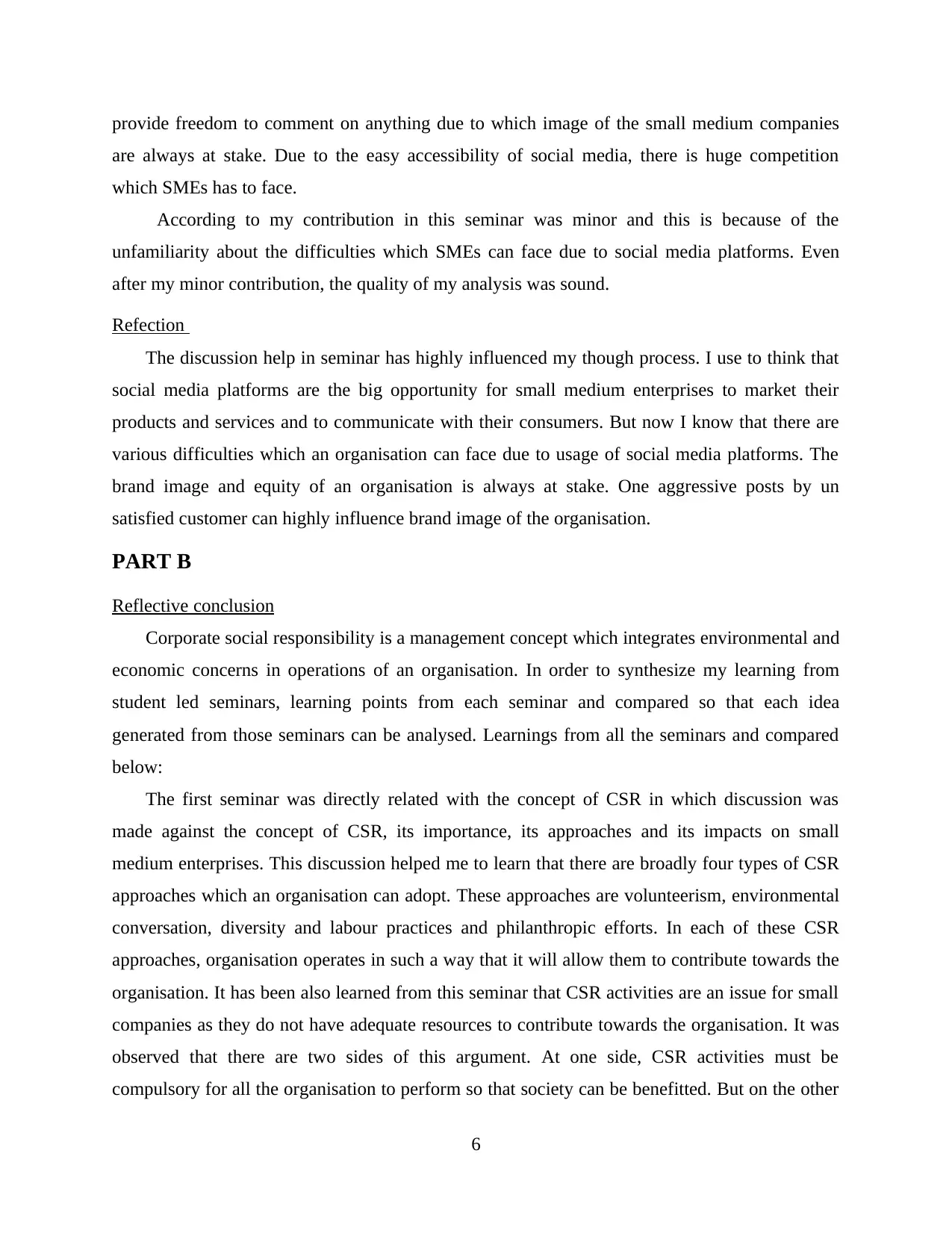
provide freedom to comment on anything due to which image of the small medium companies
are always at stake. Due to the easy accessibility of social media, there is huge competition
which SMEs has to face.
According to my contribution in this seminar was minor and this is because of the
unfamiliarity about the difficulties which SMEs can face due to social media platforms. Even
after my minor contribution, the quality of my analysis was sound.
Refection
The discussion help in seminar has highly influenced my though process. I use to think that
social media platforms are the big opportunity for small medium enterprises to market their
products and services and to communicate with their consumers. But now I know that there are
various difficulties which an organisation can face due to usage of social media platforms. The
brand image and equity of an organisation is always at stake. One aggressive posts by un
satisfied customer can highly influence brand image of the organisation.
PART B
Reflective conclusion
Corporate social responsibility is a management concept which integrates environmental and
economic concerns in operations of an organisation. In order to synthesize my learning from
student led seminars, learning points from each seminar and compared so that each idea
generated from those seminars can be analysed. Learnings from all the seminars and compared
below:
The first seminar was directly related with the concept of CSR in which discussion was
made against the concept of CSR, its importance, its approaches and its impacts on small
medium enterprises. This discussion helped me to learn that there are broadly four types of CSR
approaches which an organisation can adopt. These approaches are volunteerism, environmental
conversation, diversity and labour practices and philanthropic efforts. In each of these CSR
approaches, organisation operates in such a way that it will allow them to contribute towards the
organisation. It has been also learned from this seminar that CSR activities are an issue for small
companies as they do not have adequate resources to contribute towards the organisation. It was
observed that there are two sides of this argument. At one side, CSR activities must be
compulsory for all the organisation to perform so that society can be benefitted. But on the other
6
are always at stake. Due to the easy accessibility of social media, there is huge competition
which SMEs has to face.
According to my contribution in this seminar was minor and this is because of the
unfamiliarity about the difficulties which SMEs can face due to social media platforms. Even
after my minor contribution, the quality of my analysis was sound.
Refection
The discussion help in seminar has highly influenced my though process. I use to think that
social media platforms are the big opportunity for small medium enterprises to market their
products and services and to communicate with their consumers. But now I know that there are
various difficulties which an organisation can face due to usage of social media platforms. The
brand image and equity of an organisation is always at stake. One aggressive posts by un
satisfied customer can highly influence brand image of the organisation.
PART B
Reflective conclusion
Corporate social responsibility is a management concept which integrates environmental and
economic concerns in operations of an organisation. In order to synthesize my learning from
student led seminars, learning points from each seminar and compared so that each idea
generated from those seminars can be analysed. Learnings from all the seminars and compared
below:
The first seminar was directly related with the concept of CSR in which discussion was
made against the concept of CSR, its importance, its approaches and its impacts on small
medium enterprises. This discussion helped me to learn that there are broadly four types of CSR
approaches which an organisation can adopt. These approaches are volunteerism, environmental
conversation, diversity and labour practices and philanthropic efforts. In each of these CSR
approaches, organisation operates in such a way that it will allow them to contribute towards the
organisation. It has been also learned from this seminar that CSR activities are an issue for small
companies as they do not have adequate resources to contribute towards the organisation. It was
observed that there are two sides of this argument. At one side, CSR activities must be
compulsory for all the organisation to perform so that society can be benefitted. But on the other
6
⊘ This is a preview!⊘
Do you want full access?
Subscribe today to unlock all pages.

Trusted by 1+ million students worldwide
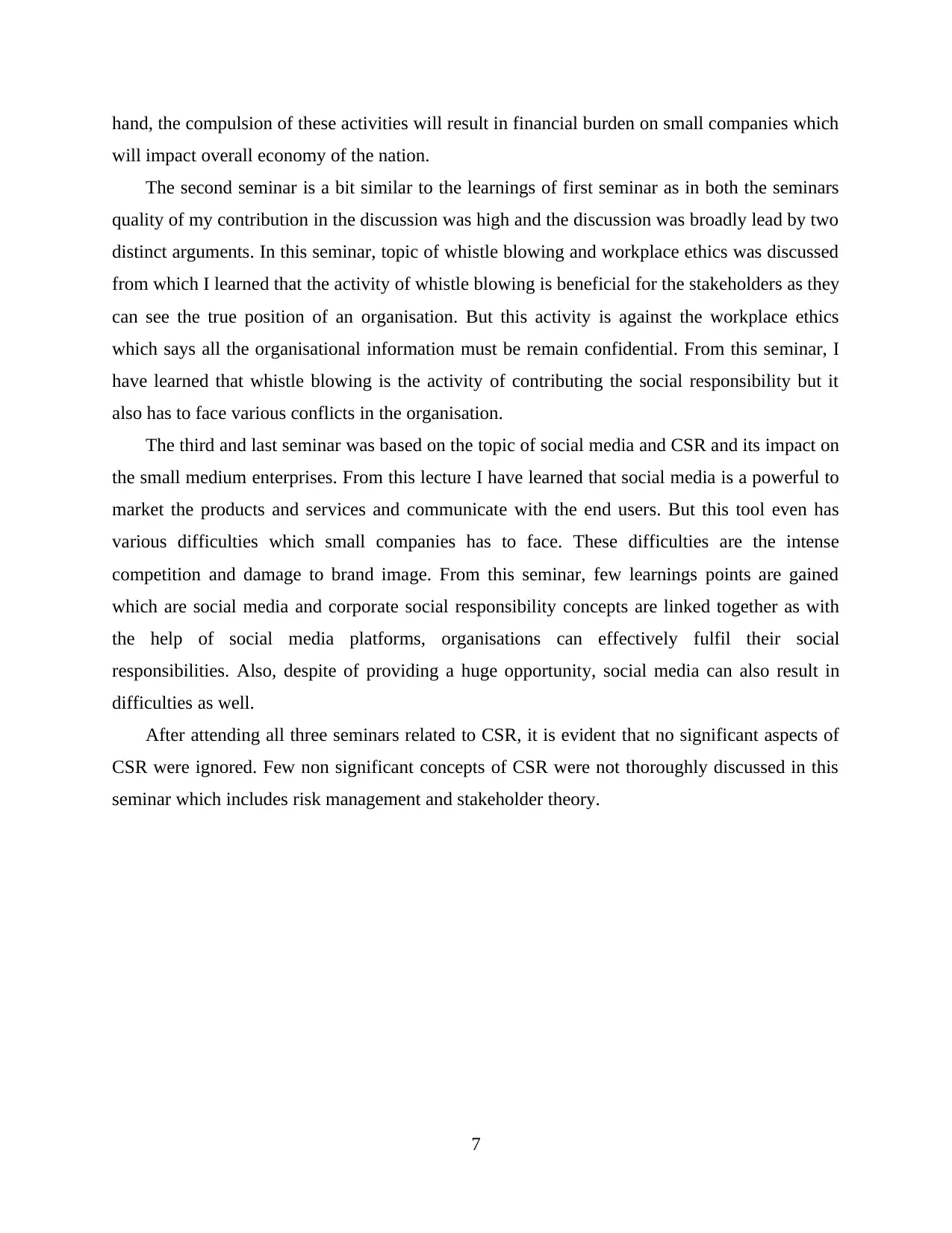
hand, the compulsion of these activities will result in financial burden on small companies which
will impact overall economy of the nation.
The second seminar is a bit similar to the learnings of first seminar as in both the seminars
quality of my contribution in the discussion was high and the discussion was broadly lead by two
distinct arguments. In this seminar, topic of whistle blowing and workplace ethics was discussed
from which I learned that the activity of whistle blowing is beneficial for the stakeholders as they
can see the true position of an organisation. But this activity is against the workplace ethics
which says all the organisational information must be remain confidential. From this seminar, I
have learned that whistle blowing is the activity of contributing the social responsibility but it
also has to face various conflicts in the organisation.
The third and last seminar was based on the topic of social media and CSR and its impact on
the small medium enterprises. From this lecture I have learned that social media is a powerful to
market the products and services and communicate with the end users. But this tool even has
various difficulties which small companies has to face. These difficulties are the intense
competition and damage to brand image. From this seminar, few learnings points are gained
which are social media and corporate social responsibility concepts are linked together as with
the help of social media platforms, organisations can effectively fulfil their social
responsibilities. Also, despite of providing a huge opportunity, social media can also result in
difficulties as well.
After attending all three seminars related to CSR, it is evident that no significant aspects of
CSR were ignored. Few non significant concepts of CSR were not thoroughly discussed in this
seminar which includes risk management and stakeholder theory.
7
will impact overall economy of the nation.
The second seminar is a bit similar to the learnings of first seminar as in both the seminars
quality of my contribution in the discussion was high and the discussion was broadly lead by two
distinct arguments. In this seminar, topic of whistle blowing and workplace ethics was discussed
from which I learned that the activity of whistle blowing is beneficial for the stakeholders as they
can see the true position of an organisation. But this activity is against the workplace ethics
which says all the organisational information must be remain confidential. From this seminar, I
have learned that whistle blowing is the activity of contributing the social responsibility but it
also has to face various conflicts in the organisation.
The third and last seminar was based on the topic of social media and CSR and its impact on
the small medium enterprises. From this lecture I have learned that social media is a powerful to
market the products and services and communicate with the end users. But this tool even has
various difficulties which small companies has to face. These difficulties are the intense
competition and damage to brand image. From this seminar, few learnings points are gained
which are social media and corporate social responsibility concepts are linked together as with
the help of social media platforms, organisations can effectively fulfil their social
responsibilities. Also, despite of providing a huge opportunity, social media can also result in
difficulties as well.
After attending all three seminars related to CSR, it is evident that no significant aspects of
CSR were ignored. Few non significant concepts of CSR were not thoroughly discussed in this
seminar which includes risk management and stakeholder theory.
7
Paraphrase This Document
Need a fresh take? Get an instant paraphrase of this document with our AI Paraphraser
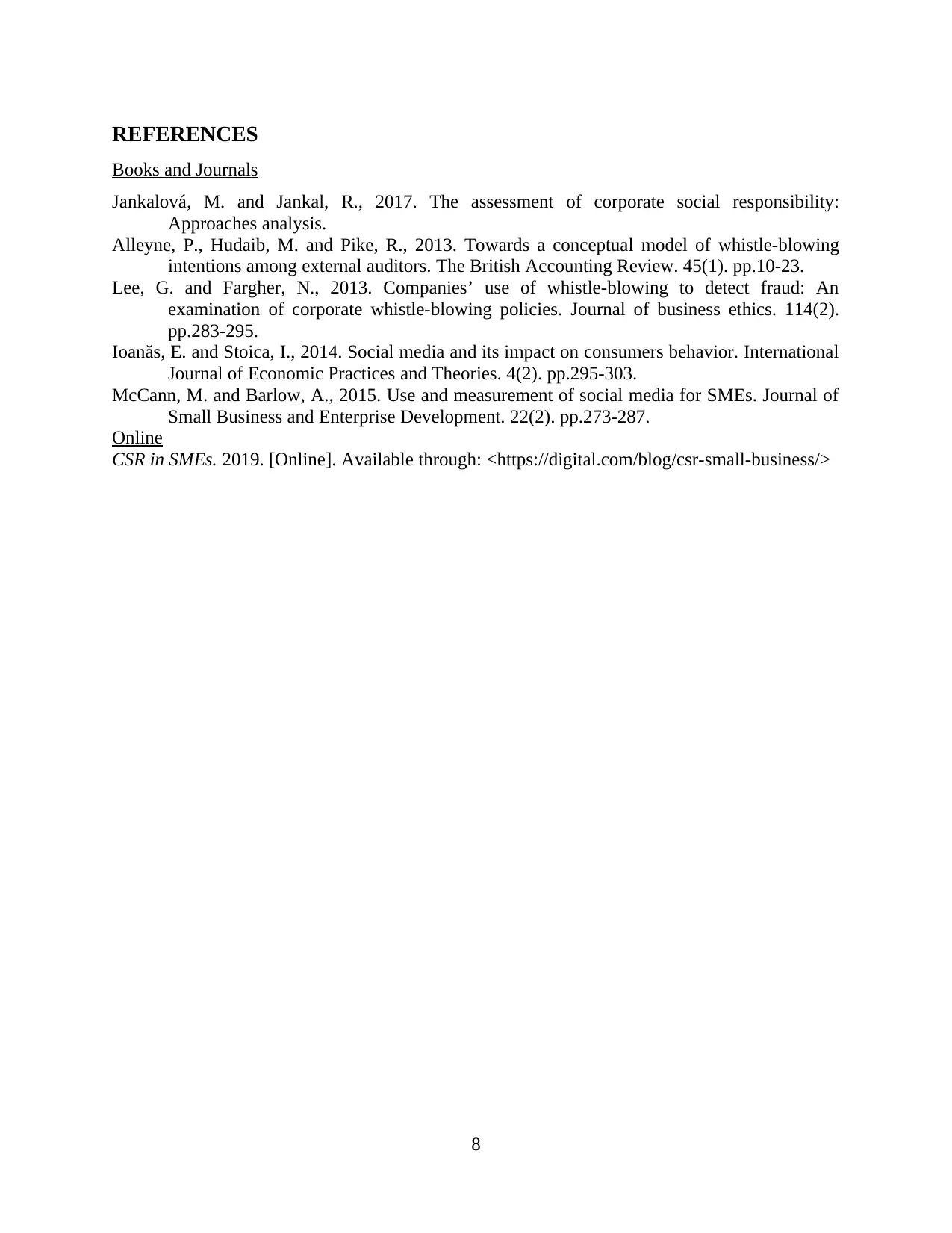
REFERENCES
Books and Journals
Jankalová, M. and Jankal, R., 2017. The assessment of corporate social responsibility:
Approaches analysis.
Alleyne, P., Hudaib, M. and Pike, R., 2013. Towards a conceptual model of whistle-blowing
intentions among external auditors. The British Accounting Review. 45(1). pp.10-23.
Lee, G. and Fargher, N., 2013. Companies’ use of whistle-blowing to detect fraud: An
examination of corporate whistle-blowing policies. Journal of business ethics. 114(2).
pp.283-295.
Ioanăs, E. and Stoica, I., 2014. Social media and its impact on consumers behavior. International
Journal of Economic Practices and Theories. 4(2). pp.295-303.
McCann, M. and Barlow, A., 2015. Use and measurement of social media for SMEs. Journal of
Small Business and Enterprise Development. 22(2). pp.273-287.
Online
CSR in SMEs. 2019. [Online]. Available through: <https://digital.com/blog/csr-small-business/>
8
Books and Journals
Jankalová, M. and Jankal, R., 2017. The assessment of corporate social responsibility:
Approaches analysis.
Alleyne, P., Hudaib, M. and Pike, R., 2013. Towards a conceptual model of whistle-blowing
intentions among external auditors. The British Accounting Review. 45(1). pp.10-23.
Lee, G. and Fargher, N., 2013. Companies’ use of whistle-blowing to detect fraud: An
examination of corporate whistle-blowing policies. Journal of business ethics. 114(2).
pp.283-295.
Ioanăs, E. and Stoica, I., 2014. Social media and its impact on consumers behavior. International
Journal of Economic Practices and Theories. 4(2). pp.295-303.
McCann, M. and Barlow, A., 2015. Use and measurement of social media for SMEs. Journal of
Small Business and Enterprise Development. 22(2). pp.273-287.
Online
CSR in SMEs. 2019. [Online]. Available through: <https://digital.com/blog/csr-small-business/>
8
1 out of 8
Related Documents
Your All-in-One AI-Powered Toolkit for Academic Success.
+13062052269
info@desklib.com
Available 24*7 on WhatsApp / Email
![[object Object]](/_next/static/media/star-bottom.7253800d.svg)
Unlock your academic potential
Copyright © 2020–2026 A2Z Services. All Rights Reserved. Developed and managed by ZUCOL.





